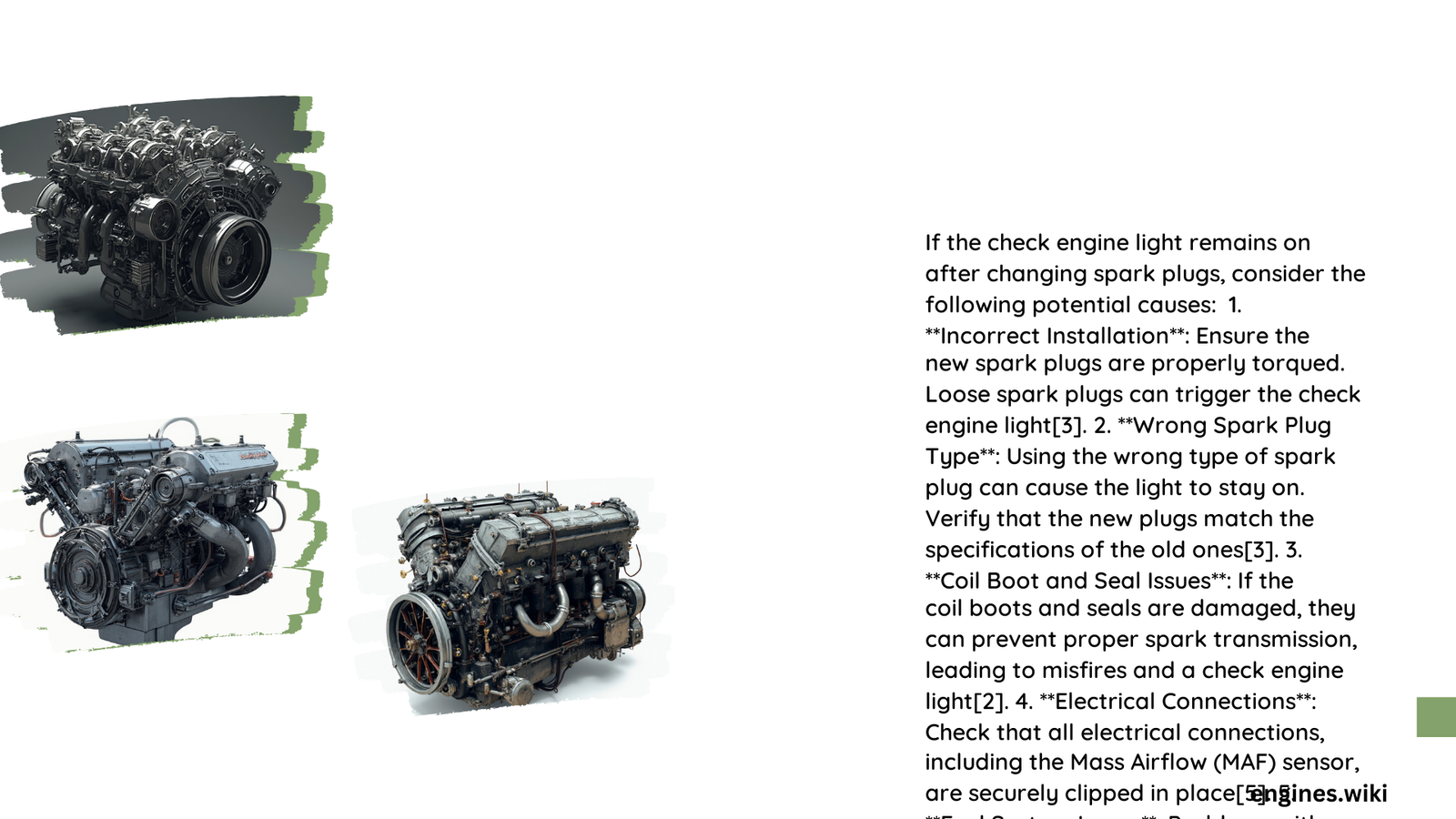Replacing spark plugs is a common maintenance task, but sometimes the check engine light remains on even after this service. This can be frustrating and indicate underlying issues with the ignition system or other related components. Understanding the potential causes and following a systematic troubleshooting process can help resolve the problem and ensure your vehicle runs smoothly.
Why Does the Check Engine Light Stay On After Changing Spark Plugs?
The persistence of the check engine light after spark plug replacement can be attributed to several factors:
- Incomplete reset of the engine control module (ECM)
- Faulty ignition coils or wires
- Incorrect spark plug gap
- Vacuum leaks
- Fuel system issues
- Sensor malfunctions
Let’s dive deeper into each of these potential causes and explore the troubleshooting steps to resolve them.
What Are the Common Diagnostic Trouble Codes (DTCs) Associated with This Issue?

When the check engine light remains on after changing spark plugs, several diagnostic trouble codes (DTCs) may be present. Here are some common ones:
| DTC | Description |
|---|---|
| P0300 | Random/Multiple Cylinder Misfire Detected |
| P0301-P0308 | Cylinder 1-8 Misfire Detected |
| P0351-P0358 | Ignition Coil Primary/Secondary Circuit Malfunction |
| P0171-P0175 | Fuel System Too Lean/Rich |
| P0420 | Catalyst System Efficiency Below Threshold |
These codes can provide valuable insights into the underlying issues causing the check engine light to stay on.
How to Troubleshoot the Persistent Check Engine Light?
Follow these steps to diagnose and resolve the issue:
-
Scan for DTCs: Use an OBD-II scanner to read and record any diagnostic trouble codes.
-
Inspect spark plug installation:
- Ensure spark plugs are properly seated and torqued
- Check for correct spark plug gap
-
Verify that the correct spark plugs were installed
-
Examine ignition coils and wires:
- Look for signs of damage or wear
- Test coil resistance with a multimeter
-
Replace faulty components if necessary
-
Check for vacuum leaks:
- Listen for hissing sounds around the engine
- Use a smoke machine to detect leaks
-
Repair or replace damaged vacuum lines
-
Inspect fuel system components:
- Check fuel pressure
- Examine fuel injectors for proper operation
-
Replace fuel filter if needed
-
Verify sensor functionality:
- Test oxygen sensors
- Inspect mass airflow sensor
-
Check engine coolant temperature sensor
-
Clear DTCs and perform a drive cycle:
- Use the OBD-II scanner to clear codes
- Drive the vehicle through a complete drive cycle
- Recheck for DTCs and check engine light status
What Are the Potential Causes of Specific DTCs?
Understanding the potential causes of specific DTCs can help narrow down the troubleshooting process:
P0300-P0308 (Misfire Codes)
- Faulty spark plugs or incorrect gap
- Damaged ignition coils or wires
- Vacuum leaks
- Fuel injector issues
- Low compression
P0351-P0358 (Ignition Coil Circuit Malfunction)
- Damaged ignition coils
- Faulty wiring or connections
- ECM issues
P0171-P0175 (Fuel System Too Lean/Rich)
- Vacuum leaks
- Faulty oxygen sensors
- Mass airflow sensor malfunction
- Fuel pressure problems
How to Reset the Check Engine Light?
After addressing the underlying issues, you can reset the check engine light using one of these methods:
- OBD-II Scanner:
- Connect the scanner to the OBD-II port
-
Follow the prompts to clear DTCs
-
Battery Disconnect:
- Disconnect the negative battery terminal for 15 minutes
- Reconnect the battery
-
Start the engine and let it idle for a few minutes
-
Drive Cycle:
- Clear the codes using an OBD-II scanner
- Drive the vehicle through a complete drive cycle
- This allows the ECM to run all necessary tests
What Preventive Measures Can Avoid Future Issues?
To prevent the check engine light from coming on after spark plug replacement:
- Use high-quality, manufacturer-recommended spark plugs
- Follow proper installation procedures and torque specifications
- Replace ignition coils and wires if they show signs of wear
- Perform regular maintenance as outlined in your vehicle’s manual
- Address any check engine light issues promptly to prevent further damage
By following these troubleshooting steps and preventive measures, you can resolve the issue of a persistent check engine light after changing spark plugs and maintain your vehicle’s optimal performance.
